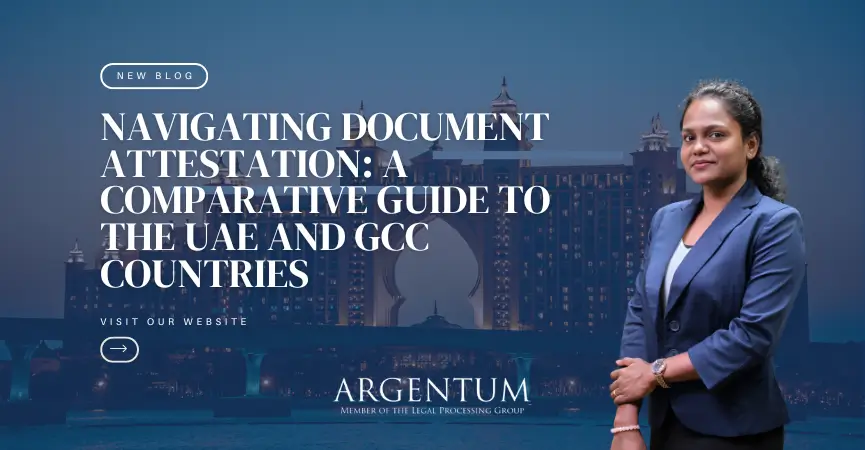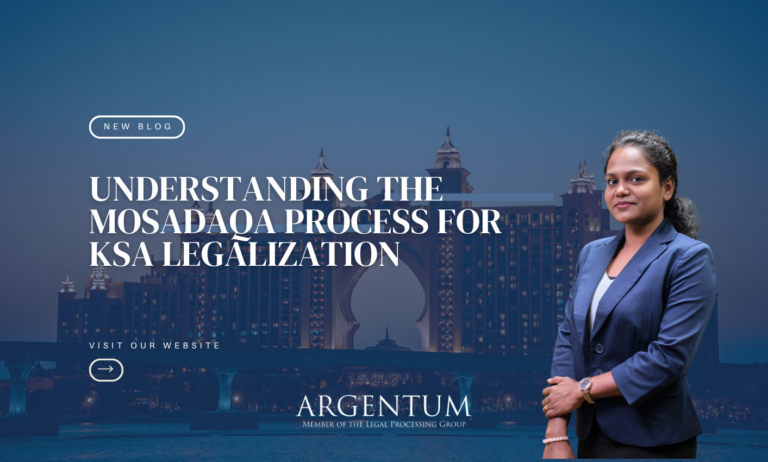Navigating Document Attestation: A Comparative Guide to the UAE and GCC Countries
UAE – Educational and Personal Documents Attestation
Navigating the document attestation process for the United Arab Emirates (UAE) can be intricate, but understanding the steps involved makes it manageable. Whether you are preparing educational documents or personal certificates such as birth and marriage certificates, the UAE has a structured process to ensure the authenticity and acceptance of your documents.
Educational Documents
For educational documents, the attestation process is as follows:
- Ministry of Education: First, the educational document must be authenticated by the Ministry of Education in the country where it was issued. This step verifies the legitimacy of the educational institution and the document itself.
- Ministry of Foreign Affairs (MOFA) in the Home Country: The next step is to have the document attested by the Ministry of Foreign Affairs in the issuing country. This ensures that the document is recognised by the country’s government.
- UAE Embassy in the Home Country: Following the MOFA attestation, the document must be attested by the UAE Embassy in the issuing country. This step is crucial as it confirms the document’s validity for use in the UAE.
- MOFA in the UAE: The final step involves the Ministry of Foreign Affairs in the UAE. This final attestation allows the document to be officially accepted within the UAE.
Birth and Marriage Certificates
For personal documents such as birth and marriage certificates, the attestation process is similar but starts with a different authority:
- Bureau or State Home Department: The initial step is to have the document authenticated by the relevant bureau or state home department in the issuing country. This step verifies the authenticity of the document.
- MOFA in the Home Country: As with educational documents, the next step is attestation by the Ministry of Foreign Affairs in the issuing country.
- UAE Embassy in the Home Country: The document is then attested by the UAE Embassy in the issuing country.
- MOFA in the UAE: The final step is the attestation by the Ministry of Foreign Affairs in the UAE, ensuring the document’s acceptance for official use.

GCC Countries – Educational and Personal Documents Attestation
The document attestation process in other Gulf Cooperation Council (GCC) countries is similar to that of the UAE, though there may be variations depending on the specific requirements and authorities involved in each country. Let’s consider Saudi Arabia as an example to illustrate the process.
Educational Documents in Saudi Arabia
The attestation process for educational documents in Saudi Arabia typically includes:
- Verification Process: This initial step involves verifying the authenticity of the educational document with the issuing institution and relevant educational authorities in the home country.
- Apostille Process: Depending on the issuing country, the document may need to go through the Apostille process, which is an international certification recognised by countries that are part of the Hague Apostille Convention.
- Saudi Culture Process (Mosadaqa): Some documents may also require a specific process known as Mosadaqa, which includes the Saudi Culture processes to ensure the document’s acceptance in Saudi Arabia.
Personal Documents in Saudi Arabia
For personal documents such as birth and marriage certificates, the process generally includes:
- Verification: Similar to educational documents, personal documents must be verified by the relevant issuing authorities in the home country.
- MOFA in the Home Country: The document must be attested by the Ministry of Foreign Affairs in the home country.
- Saudi Embassy in the Home Country: The document is then attested by the Saudi Embassy in the home country.
- MOFA in Saudi Arabia: The final step is attestation by the Ministry of Foreign Affairs in Saudi Arabia, ensuring the document’s official acceptance.
Conclusion
Understanding the document attestation processes for the UAE and other GCC countries is essential for ensuring your documents are accepted and recognised for various purposes, including employment, education, and personal matters. While the steps may vary slightly between countries, the general process involves verification by educational or local authorities, attestation by the Ministry of Foreign Affairs, and final attestation by the respective embassies and ministries of foreign affairs in the destination country. By following these steps, you can ensure a smooth and efficient attestation process.



